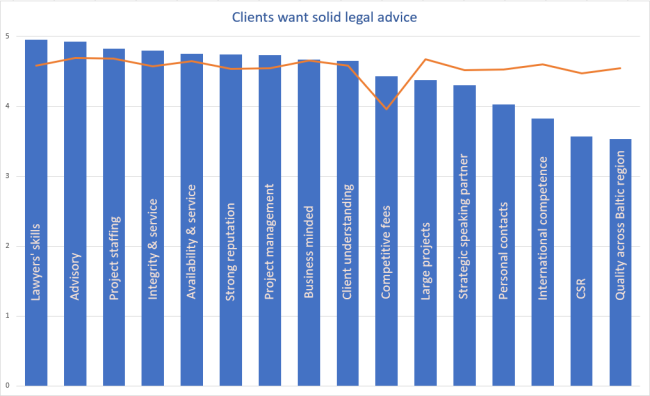 Lawyers would be wise to talk to clients openly and often, instead of being stuck in their smart expert role, says Swedish researcher Martin Salomon, commenting on the Prospera survey that measures satisfaction with law firms. He adds that, above all, clients expect lawyers to give solid legal advice, while constant communication is also important.
Lawyers would be wise to talk to clients openly and often, instead of being stuck in their smart expert role, says Swedish researcher Martin Salomon, commenting on the Prospera survey that measures satisfaction with law firms. He adds that, above all, clients expect lawyers to give solid legal advice, while constant communication is also important.
The latest Prospera survey, published at the end of May, shows high satisfaction rates among Baltic clients. “Baltic law firms have at least as good client satisfaction rates as do Scandinavian firms, if not higher,” says Salomon, head of legal research and consulting at Kantar Sifo Prospera, the company that carries out Prospera surveys.
CEOs make decisions
One factor for the high satisfaction rates is that Baltic law firms are more on their toes than their Scandinavian colleagues, owing to tough competition, according to the researcher.
Another reason is that, in the three Baltic States, legal services are more often subscribed by company CEOs and chairmen, whereas in Scandinavian firms this is often the job of in-house corporate lawyers. “Inhouse lawyers are more demanding clients,” remarks Salomon, who expects Baltic companies also to hire more in-house lawyers as the market matures.
Project management
The Prospera survey looks at an array of qualities of law firms, and asks clients about the importance of each quality. The 2018 survey shows that the most important factors for Baltic clients are lawyers’ skills and advisory capabilities, project staffing, high ethical standards, availability and good service.
According to Salomon, clients are looking for a modern law firm that takes care of clients’ interests even when projects are not in progress. “A modern law firm focuses on clients,” Salomon notes. He says clients expect law firms to provide three things – continuous communication, cost-consciousness and generous knowledge-sharing, not shying away from giving free advice at times.
Comparing Baltic law firms to Scandinavian advisers, the latter have started to hire dedicated professional project managers. Whereas Baltic law firms also claim they are on top of project management, client feedback suggests this is not really the case. Salomon notes that partners have to be convinced before they allocate budgets to actually improve client relations instead of general marketing efforts.
One feature where all Baltic firms rank below clients’ expectations is, not surprisingly, fees. This, of course, is a universal problem, since lawyers’ fees are always under discussion. If top Baltic partner rates typically remain in the 200-300 euro hourly range, these can easily be double as much in Sweden and even three times as high in Denmark. Salomon emphasises, however, that clients are not so much concerned about the exact fees as such, but want to be sure that law firms are efficient and transparent. Since clients cannot tell what a fair price is, fixed or not, lawyers have to build trust by shedding light on their efficiency measures.
Bad habits to shake off. What’s wrong with lawyers?
- Experts’ syndrome. Like doctors, many lawyers enjoy the feeling that others are seeking their expert advice. They become uncomfortable when they risk looking stupid. This stops them from asking open-ended questions about clients’ needs because they may not have all the answers. In reality, lawyers need not be all-round experts, but should rather find out what clients need and turn to colleagues for help.
- Comfort zone. Clients appreciate people who reach out, but very few lawyers do that. As they hate to look like sales people, they end up looking disinterested and not proactive at all. Clients wish lawyers were in touch more often.
- Resistance to change. Lawyers and law firms are slow to change. Since clients are reasonably happy and law firms are doing well, there’s no urgency to do so. Also, it is impossible to make a law firm change without support from the partners.
- Dangerous complacency. Being too self-satisfied is a big threat: lawyers were becoming more serious about self-improvement during the economic crisis of 2008-2009, but no longer.
- Form over substance. Law firms like to advertise themselves, but this does not necessarily help their clients. For example, it still remains to be seen if much-advertised technological advances are not just hype and actually benefit clients.
- Hoarder mentality. Partners and senior lawyers like to keep good client relationships to themselves. In reality, it is worth having client meetings with teams from both sides, to deepen the relationship and mutual understanding.
Source: Martin Salomon
How can clients get more out of law firms?
- Call early. Clients would be much better off if lawyers put more effort into the initial phases of a project. Include legal advisers a little earlier, even if you’re not sure where the project is headed, to involve a competent partner in strategic discussions.
- Reach out. If the lawyer does not contact you often enough, be the one to offer a meeting. Reach out and meet up, so you can talk about your business plans.
- Remove the elephant. If you fear that you will be charged by the minute when you shouldn’t, talk directly about the billing arrangements. Ask if you can call now and then for no charge. Many lawyers are happy to be your sounding board within reason, even if they don’t say so.
- Invest in relationships. If you are really going to be working with a law firm, involve them and make sure they understand your needs. Many big clients already do.
Source: Martin Salomon
What is a Prospera survey?
The Baltic law firm survey covers 300 Baltic-based organisations that spend at least EUR 15,000 on outside legal help annually (EUR 5,000 in Latvia). About half the respondents are top executives and a third are company lawyers.
A Prospera survey measures client satisfaction with law firms in the Baltic States as well as with law firms and banks in Scandinavia. Under a gentlemen’s agreement, results for individual law firms are not published but are used internally to improve client satisfaction.
Before joining Kantar Sifo Prospera two years ago, Martin Salomon worked as business development director of the Sweden-based law firm Mannheimer Swartling, the largest law firm by attorney headcount in the Nordic countries.



